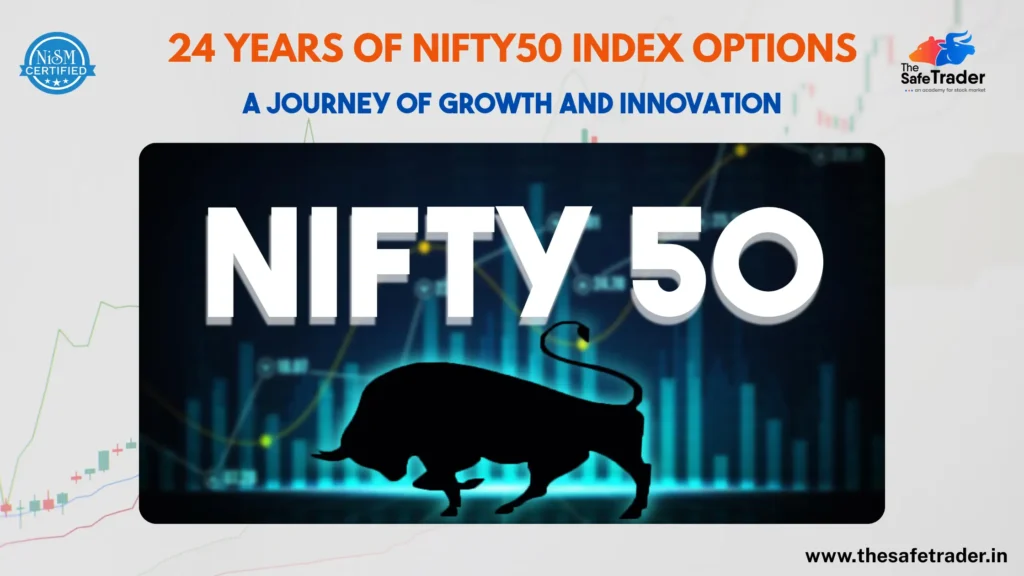
The National Stock Exchange of India (NSE) marked a significant milestone on June 4, 2025, celebrating 24 years since the launch of index options on the Nifty50 Index. Launched on June 4, 2001, the Nifty50 index options paved the way for robust derivatives trading in India, bringing new opportunities for investors and traders to manage risk and generate returns.
A Look Back: The Beginning of Nifty50 Index Options
On June 4, 2001, NSE initiated the trading of index options, more specifically on the Nifty50 Index. This had been one giant leap for the Indian capital markets, empowering the market participants with an awesome hedge tool against the risks and to speculate on the broader market movements.
From then on, the Nifty50 index options have tremendously grown in popularity to become one of the important players in the Indian derivatives market.
Expanding the Options Universe: Beyond Nifty 50
Having acknowledged the varied needs of market participants, NSE has, with time, enriched its Index Options offering. Presently, Index Options are available on five key indices, each serving a separate sector and market segment:
✅ Nifty 50: Neighborhood’s foremost index representing the top 50 blue-chip companies.
✅ Nifty Bank: Indian banking and financial sector companies of the highest order.
✅ Nifty Next 50: Constituted by the next 50 large-cap stocks outside the Nifty 50 for growth prospects.
✅ Nifty Midcap Select: Exposure to mid-cap companies, in between large and small firms.
✅ Nifty Financial Services: Targets the vibrant financial services sector of India, including NBFCs and insurance.
With such expansion, it ensures that traders have more opportunities to engage in India’s dynamic markets across various sectors and market capitalizations.
📘 Nifty 50 Stocks List (2025)
| Stock Name | Stock Name | Stock Name | Stock Name | Stock Name |
| ADANIENT | GRASIM | NESTLEIND | TATASTEEL | APOLLOHOSP |
| ADANIPORTS | HCLTECH | NTPC | TCS | ASIANPAINT |
| AXISBANK | HDFCBANK | ONGC | TECHM | BAJAJ-AUTO |
| BAJFINANCE | HDFCLIFE | POWERGRID | TITAN | BAJAJFINSV |
| BPCL | HEROMOTOCO | RELIANCE | ULTRACEMCO | BHARTIARTL |
| BRITANNIA | HINDALCO | SBILIFE | UPL | CIPLA |
| COALINDIA | HINDUNILVR | SBIN | WIPRO | DIVISLAB |
| DRREDDY | ICICIBANK | SHREECEM | LTIM | EICHERMOT |
| INDUSINDBK | INFY | SIEMENS | LTI | ITC |
| JSWSTEEL | KOTAKBANK | M&M | TATACONSUM | MARUTI |
Diverse Contract Tenures for Flexibility
A strength of NSE derivative markets is flexibility. Trading starts on Fridays and closes on Thursdays for all Index Options contracts to ease risk management for traders. The NSE has various tenures for each strategy:
- Weekly expiries: Nifty 50, short-term strategies and volatility plays.
- Monthly expiries: For all five indices, suited for swing and positional trade.
- Quarterly expiries: For Nifty 50 and Nifty Bank, suiting a longer-term view of the market.
- Half-yearly expiries: For Nifty 50, for longer horizon planning.
These multivariate tenures allow traders to finely manage their positions, modify strategies, and mitigate risks.
Global Recognition for NSE
Adding to its achievements, NSE has been recognized globally as the World’s Largest Derivatives Exchange for the 6th consecutive year in 2024, based on the number of contracts traded. This recognition underscores NSE’s leadership in providing transparent, efficient, and innovative trading infrastructure to participants worldwide.
Why the Nifty50 Index Matters
The Nifty50 is India’s country’s benchmark stock market index and represents the first 50 large-cap companies listed on the NSE. It spans several sectors such as banking, IT, energy, FMCG, etc. Being considered a barometer of economic India, it is closely followed by investors, traders, and policymakers.
Due to its high liquidity, the index is a favorite for trading of derivatives in futures and options. Nifty50, with a track record of centuries, with a high amount of participation remains an important instrument for risk management and opportunity leverage in India’s dynamic market.
Benefits of Trading Index Options
Diversification & Hedging Possibilities:
An index option provides the investor or trader an opportunity to hedge the whole portfolio or a sector-specific basket against any adverse market movement.
Lower Margin Requirements:
Traditionally, lower margins are assigned to index options as compared to those on single stocks, thus marketing them to a broader audience.
High Liquidity:
The Nifty50 options segment practically assures liquidity, making it easy for investors to enter and exit trades.
Risk Management & Flexibility:
Index options are good tools to manage market-wide risk. They are flexible tools that can be employed in numerous strategies: income generation, hedging, or taking directional bets.
FAQs
Q: When do index options expire? Why are they made to expire on Thursdays?
A: NSE standardized index options to expire on Thursdays for consistency and to provide better planning to traders. If Thursday turns out to be a holiday, the expiry takes place the previous trading day.
Q. How relevant is being recognized worldwide by the NSE?
A: Holding the position of the largest derivatives exchange worldwide for six years consecutively brings forth the image of an NSE that leads in transparency and is trusted by the market.
Q: How do index options offer protection for new traders?
A: Index options offer a safer starting place for new traders because they tend to be less volatile than single-stock options and allow one to diversify.
Final Thoughts
As NSE celebrates 24 years of Nifty50 index options trading, it’s clear that the exchange has played a transformative role in India’s capital markets. With cutting-edge infrastructure, robust risk management systems, and a growing suite of index options, NSE continues to be the cornerstone for Indian investors and traders.
Whether you’re a beginner exploring index options or a seasoned trader refining your strategies, the Nifty50 and other index options offer immense potential. Let’s look forward to many more years of growth, learning, and opportunities!
👉 Join The Safe Trader Academy today and start trading like a pro.

